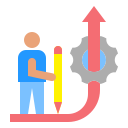Stories from the Field
A project manager juggling sprints and stakeholder meetings carved out ten-minute learning bursts between standups. The platform learned her rhythm, prioritized risk topics, and embedded quick retrospectives. After six weeks, her team cut rework by fourteen percent. Share your schedule constraints, and we’ll suggest adaptive time windows that actually fit.
Stories from the Field
On rotating shifts, long courses were impossible. Adaptive modules delivered focused patient-safety scenarios and quick refreshers on new devices. Confidence scores guided extra practice before high-stakes nights. Within a month, incident reports dropped, and onboarding felt calmer. Healthcare readers, what micro-scenarios would help you most this quarter?
Stories from the Field
A senior engineer prepping for a lead role used adaptive simulations to practice coaching, delegation, and feedback. The system identified over-explaining as a pattern and introduced role-play prompts to build brevity. Three months later, sprint planning ran smoother, and conflicts de-escalated faster. Tell us your next role, and we’ll map skills to target.





